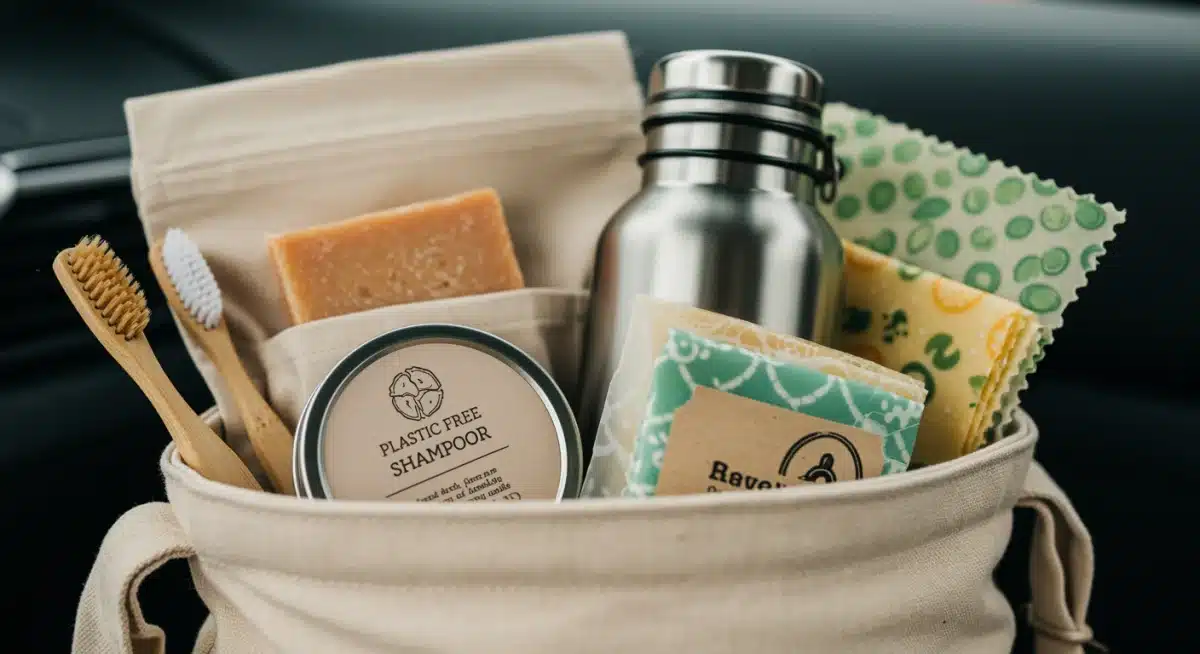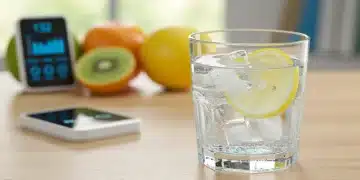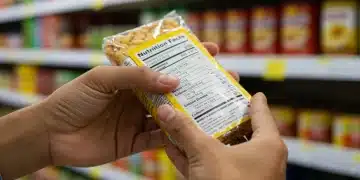2025 Travel Shift: 8 Must-Have Plastic-Free Essentials for US Road Trips

The 2025 travel shift emphasizes sustainable practices; preparing for your next US road trip now requires integrating 8 essential plastic-free items to minimize environmental impact and enhance your journey.
As 2025 approaches, a significant shift in travel philosophy is emerging, prioritizing sustainability and environmental responsibility. For those planning their next adventure, particularly a US road trip, embracing The 2025 Travel Shift: 8 Must-Have Plastic-Free Essentials for Your Next US Road Trip is becoming not just a trend, but a necessity. This guide provides timely insights into how to prepare for eco-conscious travel, ensuring your journey is as impactful on you as it is minimal on the planet.
Understanding the 2025 Travel Shift Towards Sustainability
The travel industry is currently undergoing a transformative period, with a growing emphasis on sustainable practices. As of early 2024, reports indicate a clear consumer preference for eco-friendly travel options, pushing providers to adapt. This shift, set to solidify by 2025, is driven by heightened environmental awareness and increasing concerns over plastic pollution, particularly in natural landscapes and national parks across the US. Travelers are actively seeking ways to reduce their ecological footprint, making plastic-free solutions a cornerstone of future travel planning.
This evolving landscape means that traditional single-use items are rapidly being phased out in favor of reusable and biodegradable alternatives. The impetus comes from both individual consumer choices and broader industry initiatives, including stricter regulations on plastic usage in various tourist destinations. The goal is to preserve the pristine beauty of our natural wonders, ensuring they remain accessible and enjoyable for generations to come. This proactive approach aims to mitigate the environmental damage caused by mass tourism, fostering a more responsible way to explore.
Reusable Water Bottles: A Road Trip Must-Have
One of the most immediate and impactful changes a traveler can make is to ditch single-use plastic water bottles. The ubiquity of plastic bottles on US roadsides and in landfills is staggering. Investing in a high-quality reusable water bottle is a foundational step towards a plastic-free road trip, offering both environmental benefits and practical advantages for the traveler. These bottles are designed for durability and often feature insulation to keep drinks cold or hot for extended periods, a significant plus during long drives.
Choosing the Right Reusable Bottle
- Material: Opt for stainless steel or glass for maximum durability and no chemical leaching.
- Insulation: Double-walled vacuum insulation is ideal for maintaining beverage temperature.
- Size: Consider a 24-32 ounce bottle to reduce refill frequency, especially in remote areas.
- Lid Type: A leak-proof lid with a wide mouth is convenient for cleaning and adding ice.
Many national parks and rest stops across the US are increasingly offering water refill stations, making it easier than ever to stay hydrated without contributing to plastic waste. This growing infrastructure supports the shift towards sustainable travel, as reported by national park services. By carrying your own, you’re not only saving money but also actively participating in the movement to protect our precious natural resources.
Solid Toiletries: Compact and Eco-Friendly
Traditional liquid toiletries often come in plastic bottles that are difficult to recycle and contribute significantly to waste. The solution lies in solid alternatives, which are gaining immense popularity for their eco-friendliness and travel convenience. Items like shampoo bars, conditioner bars, solid soaps, and even solid toothpaste tabs eliminate the need for plastic packaging and are often made with natural, biodegradable ingredients. These compact essentials are also free from liquid restrictions for air travel, making them versatile for any journey that might start or end with a flight.
The market for solid toiletries has expanded dramatically, offering a wide range of options to suit various hair and skin types. Brands are now focusing on creating high-performance products that rival their liquid counterparts, ensuring travelers don’t have to compromise on quality or effectiveness. Furthermore, these products tend to last longer than liquid versions, offering better value over time. They are also less prone to leaking, preventing messy spills in your luggage—a common road trip woe.
Reusable Utensils and Straws: Dining Sustainably on the Go
Eating on the road often involves takeout and convenience foods, which notoriously come with single-use plastic cutlery and straws. To combat this, carrying your own reusable utensil set and straw is a simple yet powerful step. These sets typically include a fork, spoon, knife, and a reusable straw, often made from bamboo, stainless steel, or even titanium. They are usually compact, lightweight, and come in a small pouch for easy transport and hygiene.

Benefits of Carrying Your Own Utensils
- Waste Reduction: Directly eliminates reliance on single-use plastics from fast food and picnic meals.
- Hygiene: You know where your utensils have been cleaned and stored.
- Cost-Effective: No need to purchase new cutlery with every meal.
- Versatility: Suitable for camping, picnics, and restaurant takeout.
This practice aligns perfectly with the 2025 travel shift, where personal responsibility for environmental impact is paramount. Many eco-conscious travelers have already integrated these items into their daily routines, extending the practice to their road trip adventures. Look for sets that are easy to clean and dishwasher safe for maximum convenience.
Cloth Bags and Reusable Produce Bags: Shopping Smart
Road trips often involve impromptu grocery stops or visits to local markets. Single-use plastic bags are a major environmental culprit, and many states and cities across the US have already implemented bans or fees on them. Carrying a few sturdy, reusable cloth bags and smaller reusable produce bags is an indispensable part of a plastic-free road trip. These bags are not only excellent for groceries but also serve myriad purposes, from organizing items in the car to carrying souvenirs.
Modern reusable bags are designed to be lightweight, foldable, and durable, making them easy to store in a glove compartment or backpack. Produce bags, typically made from mesh cotton, allow you to buy fruits and vegetables without using those flimsy plastic bags offered in grocery stores. This small change collectively makes a huge difference in reducing plastic waste. As reported by environmental advocacy groups, the average person uses hundreds of plastic bags annually, a number that can be drastically cut down with conscious choices during travel.
Beeswax Wraps and Reusable Food Containers: Sustainable Snacking
Snacks are an integral part of any road trip, but they often come with excessive plastic packaging. Embracing beeswax wraps and reusable food containers is a game-changer for sustainable snacking. Beeswax wraps are natural, reusable, and biodegradable alternatives to plastic cling film, perfect for wrapping sandwiches, fruits, and leftovers. They are also naturally antibacterial and breathable, keeping food fresh longer.
Why Choose Beeswax Wraps and Reusable Containers?
- Reduce Plastic Waste: Directly replaces single-use plastic wrap and sandwich bags.
- Food Preservation: Keeps food fresher than plastic alternatives in many cases.
- Versatility: Ideal for wrapping various foods and covering bowls.
- Durability: With proper care, they can last for a year or more.
Reusable food containers, made from stainless steel or glass, are also excellent for packing meals, storing bulk snacks, or bringing leftovers from restaurants. They are durable, easy to clean, and prevent food from getting crushed during transit. This approach not only minimizes your environmental footprint but also encourages healthier eating habits by preparing your own snacks and meals.
Portable Coffee Cups: Enjoying Your Brew Responsibly
For many, a road trip isn’t complete without coffee, but disposable coffee cups, often lined with plastic, are a significant source of waste. A reusable portable coffee cup is an absolute essential for any eco-conscious traveler. Many coffee shops, including major chains, now offer discounts for bringing your own cup, making it a financially smart choice in addition to being environmentally responsible.
These cups come in various materials, including stainless steel, glass, and bamboo, each offering different benefits regarding insulation, durability, and weight. Choosing one that fits comfortably in your car’s cup holder and is easy to clean is key. By making this simple switch, you can significantly reduce the amount of waste generated during your road trip, aligning with the growing demand for sustainable consumer choices as we head into 2025.
Microfiber Towels: Lightweight and Efficient
While not strictly plastic-free in their composition, high-quality microfiber towels can significantly reduce the need for single-use paper towels and minimize laundry cycles, making them a more sustainable choice for road trips. Their highly absorbent and quick-drying properties mean you can pack fewer towels and use them for multiple purposes, from drying off after a swim to cleaning up spills in the car. This efficiency translates to less water and energy consumption over the course of your trip.
When selecting a microfiber towel, look for durable options designed for travel and outdoor activities. Many are compact and come with their own reusable carrying pouch. While the long-term goal is to find completely plastic-free alternatives that offer the same performance, current microfiber technology provides a practical interim solution for reducing overall waste and resource use during travel. This pragmatic approach acknowledges existing product limitations while still striving for greater sustainability.
Biodegradable Wipes and Toilet Paper: Addressing Hygiene Needs
Hygiene on the road is crucial, but traditional wet wipes are often laden with plastics and non-biodegradable materials. The 2025 travel shift calls for embracing biodegradable wipes and toilet paper. These products are designed to break down naturally, minimizing environmental impact, especially when used in natural settings or where waste disposal options are limited. They are typically made from plant-based fibers and are free from harsh chemicals and synthetic fragrances.
For road trippers, having access to these eco-friendly options provides peace of mind, knowing that their convenience doesn’t come at the cost of the environment. Many brands now offer travel-sized biodegradable wipes that are perfect for quick clean-ups, and portable biodegradable toilet paper rolls are available for camping or remote stops. Always remember to dispose of even biodegradable products responsibly, following Leave No Trace principles, especially in wilderness areas.
| Key Essential | Brief Description |
|---|---|
| Reusable Water Bottle | Eliminates single-use plastic bottles, essential for hydration and waste reduction. |
| Solid Toiletries | Shampoo bars, soaps, and toothpaste tabs reduce plastic packaging and liquid waste. |
| Reusable Utensil Set | Avoids single-use plastic cutlery and straws for on-the-go meals and snacks. |
| Beeswax Wraps | Eco-friendly alternative to plastic cling film for food storage and preservation. |
Frequently Asked Questions About Plastic-Free Road Trips
The increasing global awareness of plastic pollution and its environmental impact is driving a significant shift. By 2025, consumer demand and industry regulations are pushing for more sustainable travel options, making plastic-free choices essential for responsible tourism.
While some plastic-free items might have a slightly higher upfront cost, they are often more durable and reusable, leading to significant savings over time by eliminating the need for repeated purchases of single-use alternatives.
Many national parks, campgrounds, and even city centers are increasing their public water refill station availability. Utilizing apps like ‘RefillMyBottle’ or checking official park websites can help locate convenient refill points along your route.
Stainless steel and glass are highly recommended for reusable food containers due to their durability, ease of cleaning, and inert properties, ensuring no chemicals leach into your food. Silicone containers are also a good flexible option.
Not at all. Most plastic-free essentials are designed for easy cleaning and portability. Simple rinsing or occasional washing with eco-friendly soap is usually sufficient, making them practical for even extended periods on the road.
Looking Ahead: The Future of Sustainable Road Travel
The trajectory for travel, particularly road trips, is unequivocally leaning towards greater sustainability. As of now, the advancements in eco-friendly product development continue to accelerate, offering travelers more accessible and effective plastic-free choices. This sustained momentum suggests that by 2025, these essentials will be standard, not exceptions. We anticipate further infrastructure development to support sustainable practices, such as more ubiquitous recycling facilities and water refill stations, making plastic-free travel even more seamless. The collective impact of individual choices, coupled with industry innovation and policy changes, is setting the stage for a truly transformative era in how we explore our world.





